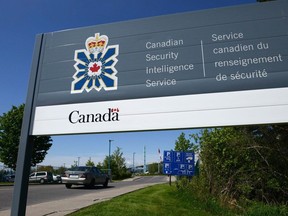Breadcrumb Trail Links
Working in the shadows is a civilian army of more than 6,400 intelligence practitioners in the Canadian Security Intelligence Service and the Canadian Security Establishment. They labour around the clock to keep us safe.
 Too many people don’t even know what the Canadian Security Intelligence Service does. Photo by Sean Kilpatrick /THE CANADIAN PRESS
Too many people don’t even know what the Canadian Security Intelligence Service does. Photo by Sean Kilpatrick /THE CANADIAN PRESS
Article content
By: Matthew MacDonald
Prime Minister Mark Carney has pledged to meet Canada’s NATO obligation to invest two per cent of GDP in defence by the end of the year. But at a time of growing political instability, it’s important to remember that soldiers are not the only ones protecting Canada.
Working in the shadows, Canada has a civilian army of more than 6,400 intelligence practitioners in the Canadian Security Intelligence Service (CSIS) and the Canadian Security Establishment (CSE) — both with headquarters in Ottawa, where most of their staff are — working around the clock to keep us safe. Unfortunately, according to a Public Safety Canada survey in 2021, 54 per cent of Canadians don’t know what they do. Also, despite the vital role they play in Canada’s defence, their budgets are not included in NATO’s calculation of Canada’s defence spending.
Advertisement 2
Article content
There are some important reasons for that, but it comes at a cost.
For one, it can create a political disincentive to invest in domestic intelligence — although, for Canada, that’s nothing new. Of the countries that form the Five Eyes intelligence-sharing network, only New Zealand spends less than Canada on its intelligence agencies. Australia, meanwhile, with two-thirds the population, spends 22 per cent more ($2.2 billion Cdn) than Canada ($1.8 billion).
All this is dwarfed by the United States, of course, which had a budget of $104 billion Cdn for civilian intelligence in 2024.
Canada can’t hope to come anywhere close to that anytime soon, but neither should it be complacent.
The fact is, with President Donald Trump’s threats to annex Canada, tariffs, foreign interference, rampant disinformation and misinformation, and growing political unrest, the military isn’t enough. Canada needs intelligence specialists who can effectively monitor and disrupt threats of all kinds, at home and abroad, wherever they come from, before they become headlines.
Advertisement 3
Article content
There’s a practical reason NATO doesn’t include civilian intelligence spending in its calculation of a country’s defence spending, of course: the classified nature of the spending makes it hard to standardize across countries.
But this technical barrier can have real strategic consequences, unintentionally discouraging critical investments in non-military intelligence capabilities and even contributing to a lack of public awareness, respect and understanding for the work intelligence agencies do.
In countries such as Canada that are under political pressure to meet NATO’s two-per-cent GDP defence spending target (Canada hasn’t spent two-per-cent of GDP on defence since 1988), the problem is compounded. If Canada is already struggling to meet the target, why spend money on intelligence that doesn’t count, when the military is underfunded too?
Advertisement 4
Article content
The problem with this logic, however, is that it may paradoxically lead to imbalanced security postures where traditional military capabilities are overfunded at the expense of intelligence and hybrid threat responses, putting the country at even greater risk.
Thankfully, Carney has taken a series of steps that suggest he genuinely wants to position Canada as a credible superpower. To what extent that’s achievable remains to be seen, but one thing is for sure, genuine superpowers don’t invest just because it looks good, but because it makes a real difference.
Which means Canada, if it wants to be a superpower — or even just defend itself — can’t afford to neglect its military or its intelligence services any longer, whether NATO counts it or not.
Matthew A. MacDonald, PhD, is an Ottawa-based writer, filmmaker, and political scientist. He is currently developing a major documentary series about Canadian security and intelligence. macdonaldcinema.com
Read More
Raises, retention bonuses promised for Canadian Forces personnel
Carney’s spending promises will require ‘significant cuts’ to the public service: PBO
Article content
Share this article in your social network

